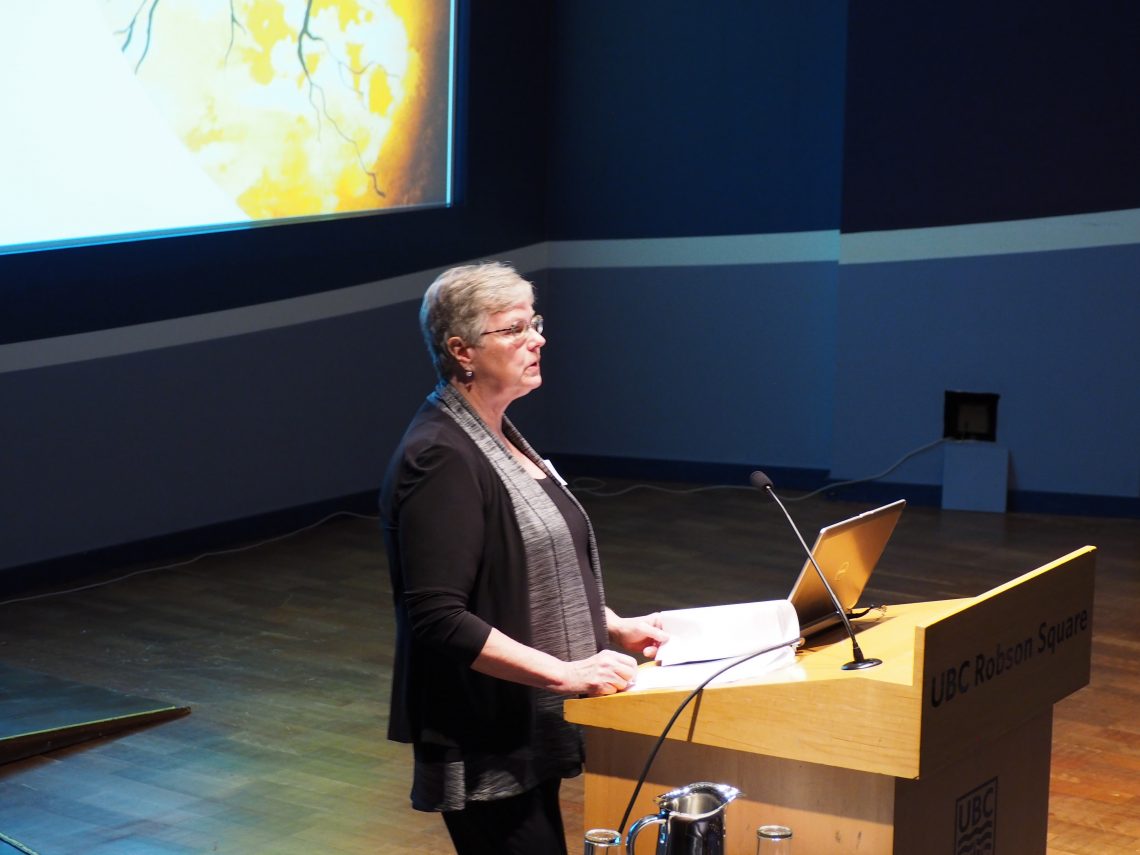Challenging Old and Persistent Paradigms
Marion Woodward Lecturer 2017: Deborah S. Finnel
Attendees at the 2017 Marion Woodward Lecture on October 5 walked away with a threefold message delivered by Dr Deborah Finnell, a researcher, nurse practitioner, and a professor at John’s Hopkins University’s School of Nursing:
- mental and substance use disorders are brain-based,
- words matter,
- the nursing workforce must build capacity to address the needs of these vulnerable populations.
The Marion Woodward Lecture, which is supported annually by the Mr and Mrs P.A. Woodward’s Foundation each fall, features a guest speaker, refreshments, and plenty of discussion. A symposium held in the afternoon shadows the lecture topic with a companion panel discussion. In her presentation Mental Illness and Substance Use: challenging old and persistent paradigms, Dr Finnell urged the packed house at UBC’s Robson Square to examine our perceptions and paradigms about mental illness and substance use disorders. She challenged us to help to remove the stigma that prevents this vulnerable population from seeking and receiving health care.
“Keeping in mind that nurses are among the most trusted profession,” Dr Finnell pointed out, “we have the closest contact with patients and we have the most prolonged time with patients, we can help to address some of the needs of this population – if we have the will to do so.”
“I thought I felt this way and drank because I was weak-willed.”
Mental and Substance Use Disorders are Brain-Based
With a nod to the advances in neurosciences that have led to a better understanding of the brain’s structure and function, Dr Finnell examined what is meant by brain-based disorders: the result of “neurobiological dysfunctions that make an individual sensitive to both internal and external stimuli.” According to Dr Finnell, the evidence points to structural and neurochemical dysfunctions, not merely criteria based on “what we can observe and on what the person reports” as outlined in the Diagnostic and Statistical Manual (DSM). That omission from the DSM “reinforces the behavioural paradigm that the person should be able to control his or her behaviour. It also reinforces the moral paradigm that in failing to control themselves, these people are weak-willed or somehow personally responsible.” To stop the stigma, Dr Finnell urges, “we must focus on what we cannot directly observe: that which is disordered in the brain.”
Dr Finnell took us on a tour of the limbic system, especially the manufacturing sites for the key neurotransmitters – dopamine, serotonin and norepinephrine, reminding us how each drug initiates certain responses as it is produced, such as motivation, craving, and lethargy.
Dr Finnell also reminded us that the person with a brain disorder is not the only one whose impulses may seem out of their control. Nurses know about the neurobiological bases of peoples’ behaviour – but how has that knowledge been applied in forming opinions about others? Far-reaching implications accompany a nurse’s ability to root in science a natural impulse to pre-judge. Dr Finnell suggests that when we “[shift] the paradigm from a moral one to a biological one, just as has occurred with leprosy, epilepsy, and AIDS, this vulnerable population may experience less shunning and rejection and thus be more willing to seek and accept treatment.”
“I was depressed before I used cocaine. Now I know why I’m more depressed after I use and stop.”
Positive responses from her patients prompted Dr Finnell’s first publication: “The Case for Teaching Patients about the Neurobiological Basis of Addictions.” Dr Finnell and her colleagues have produced several publications that have been used to form health care policies at the federal level in the United States, and helpful resources have been developed from ongoing research. This includes work that Dr Finnell and her colleagues conducted in revising and updating the language of two common questionnaires that had been used to assess perceptions and attitudes in health care providers – because words matter.
Words Matter
In a 2014 publication, the editorial board of Dr Finnell’s Substance Abuse Journal appealed to authors, reviewers, and readers to use language that: respects the worth and dignity of all people, or “people-first language;” focuses on the medical nature of substance-use disorders and treatment; promotes the recovery process; and avoids perpetuating negative stereotypes and biases through the use of slang and idioms. Reviewing The Alcohol and Alcohol Problems questionnaire from 1978 and the Drug and Drug Perceptions questionnaire from 2006, Dr Finnell and her team transformed phrases to fit the new requirements.
Use language that:
- Respects the worth and dignity of all people – or “people-first language”
- Focusses on the medical nature of substance-use disorders and treatment
- Promotes the recovery process
- Avoids perpetuating negative stereotypes and biases through the use of slang and idioms
“Advances in science lead to greater understanding and knowledge about the etiology of disease, treatment, and prevention. We can and should translate the evidence to patients, families, and the public.”
The Nursing Workforce Must Build Capacity to Address the Needs of These Vulnerable Populations
In the process of disseminating their findings, Dr Finnell’s team researched the amount of content in nursing curricula that would equip graduates in the field. The content is abbreviated as SBIRT: Screening, Brief Intervention, and Referral to Treatment. They found “clear evidence that nurses, like many other health care providers, are illequipped to address the continuum of substance use.” They developed a four part process to remedy the situation, producing “Integrating Substance Use Content in an ‘Overcrowded’ Nursing Curriculum”, and introducing modules into relevant existing courses, guided by the American Association of Colleges of Nursing Essentials for bachelor’s, master’s, and doctorate degree programs. They also turned their attention to creating an online program to increase the knowledge and skills of the current nursing workforce, with an additional online program “for health care providers who are seeking foundational knowledge related to substance use screening, brief intervention, and referral to treatment.”
Dr Finnell closed her talk by urging her audience to “believe and promote the evidence” in order to change paradigms that are barriers to effectively serving patients.
The Marion Woodward Lecture is made possible through the generous support of the Mr and Mrs P. A. Woodward’s Foundation.



